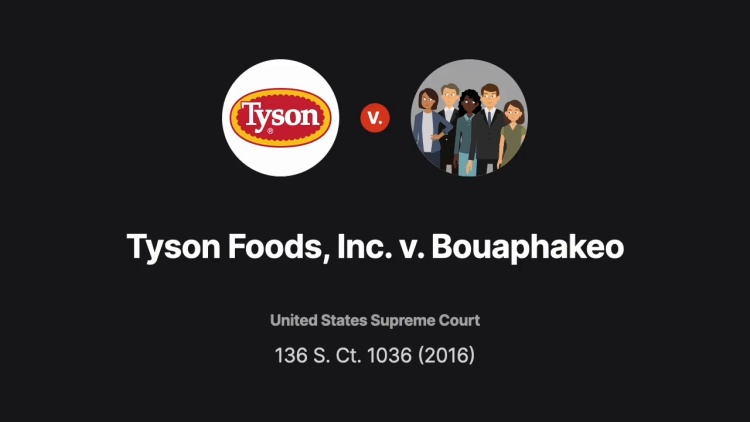Tyson Foods, Inc. v. Bouaphakeo
United States Supreme Court
136 S. Ct. 1036, 194 L. Ed. 2d 124 (2016)

- Written by Mary Phelan D'Isa, JD
Facts
A class of employees led by Bouaphakeo (employees) (plaintiffs) filed an action against Tyson Foods, Inc. (Tyson) (defendant). The suit alleged violations of the federal Fair Labor Standards Act and the Iowa Wage Payment Collection Law for Tyson’s failure to pay overtime to the employees for their time spent donning and doffing protective equipment the employees needed to perform their meat-packing-plant jobs. Because Tyson did not keep records of the employees’ donning and doffing time, the employees used representative evidence of that time that was compiled in a study by an industrial-relations expert. Tyson did not challenge the statistical validity of the study nor the expert; however, Tyson argued that the use of the representative evidence was unfair, and that because the employees needed varying amounts of time to don and doff their job-specific protective equipment, the claims were too speculative for class treatment. The employees argued that the study was a permissible means for them to fill an evidence gap created by Tyson’s failure to keep adequate records, and that the study supplied evidence for the predominance element needed for class certification. The district court granted class certification to the employees’ case, which proceeded to a trial that resulted in a $2.9 million award for the employees for unpaid wages. Tyson moved to set aside the verdict, and the district court denied the motion. Tyson appealed, and the Court of Appeals for the Eighth Circuit affirmed. Tyson filed for a writ of certiorari.
Rule of Law
Issue
Holding and Reasoning (Kennedy, J.)
Dissent (Thomas, J.)
What to do next…
Here's why 907,000 law students have relied on our case briefs:
- Written by law professors and practitioners, not other law students. 47,100 briefs, keyed to 996 casebooks. Top-notch customer support.
- The right amount of information, includes the facts, issues, rule of law, holding and reasoning, and any concurrences and dissents.
- Access in your classes, works on your mobile and tablet. Massive library of related video lessons and high quality multiple-choice questions.
- Easy to use, uniform format for every case brief. Written in plain English, not in legalese. Our briefs summarize and simplify; they don’t just repeat the court’s language.





